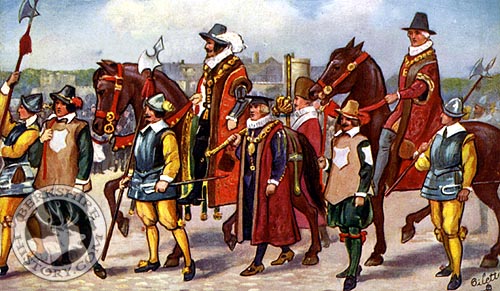 |
 |
|||
|
 Kidnap
of the Kidnap
of theMayor of Reading To Pay or Not to Pay? In
May 1644, King Charles I gave orders that Reading,
which had been held by his forces since September 1643, should be
abandoned. He knew that a Roundhead army was advancing from London and
he feared that he was not strong enough to hold Reading against it.
Before leaving, however, he caused the fortifications of Reading to be
destroyed, so that they should not be used against him by his enemies.
The Royalists then marched away to Oxford. Soon afterwards the troops of
the Earl of Essex again occupied the town. A
change of masters made little difference to the people of Reading, for
both sides always made ruinous demands upon them for money and labour.
But little did they foresee what was now to happen. A few miles away,
Lieutenant-Colonel Lower held Wallingford
for the King. He knew that Reading had not paid all the money asked for
by Charles, and he knew, also, that the Roundhead force in Reading was
as yet small. He now planned a daring stoke. Suddenly, on the night of
2nd June, a party of Royalist horsemen swooped down upon the town and
carried off William Brackston, the Mayor, to Wallingford. From
Wallingford, they allowed the Mayor to send a letter to the aldermen of
Reading, saying that he would be kept a prisoner until the money
demanded from the town by the King should be paid. The aldermen at
Reading wrote back to ask how much money was wanted. On this thorny
subject, letters passed to and fro. Colonel Lower was very polite. He
offered to exchange the Mayor for two aldermen; but he said he should
not give him up until he was assured that the money would be paid over.
The aldermen at Reading knew not what to do. None of them seems to have
been anxious to be exchanged for the Mayor, nor did they know where to
turn for money. On 25th June, they met privately at the house of one of
their number. They had, before them, the King's demand for £150 (about
£13,000 today) already due, and for £50 (about £4,000) a week
henceforth for the maintenance of the garrison at Wallingford. This
letter was much debated and considered. There was hardly any money left
in the town. At length, they resolved to send a submissive answer and to
say that they wished they could do what was asked, but they were quite
unable, and that they therefore begged that Colonel Lower would show
forbearance towards them. On the next day, Lower wrote back to say that
this kind of reply was not what he wanted. Nevertheless, he would
consent to accept £100 (about £8,500 today), and be content with less
than £50 a week. However, until they agreed to these modified terms,
the Mayor would stay at Wallingford. Further, if it should come to his
ears that the aldermen were helping the rebels he would double his
demands. Again,
there was a private meeting of the aldermen at Reading and, again, they
resolved to beg Lower to forbear. They also sent a petition to the King,
at Oxford, asking for the release of the Mayor and for an abatement of
the demands made upon them for money. The council at Oxford seem to have
given some attention to this entreaty and it would seem that, before
long, the Mayor regained his liberty and returned to Reading. Yet, to
the end of his days, he would remember the wild gallop through the
summer lanes on the night when he was kidnapped by the Cavaliers. Edited from W.M. Childs' "The Story of the Town of Reading" (1905)
|
|||
| © Nash Ford Publishing 2017. All Rights Reserved. | ||||





